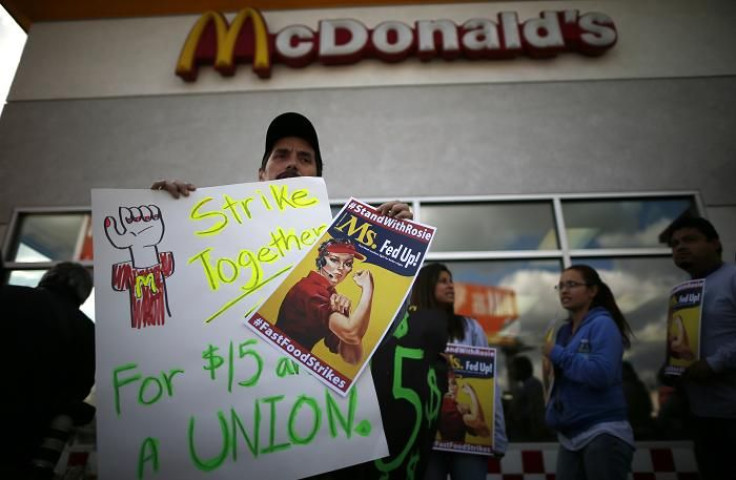US Labor Agency Accuses McDonald's Of Violating Labor Rights Over Fast Food Workers Movement

The U.S. National Labor Relations Board slapped a unit of the McDonald’s Corp. and some of its franchise restaurants with multiple complaints, accusing the fast-food giant of violating employees’ rights after they demonstrated for higher wages and better working conditions. The NLRB move drew bouquets from labor activists and brickbats from business leaders, who said naming McDonald’s together with franchise owners could disrupt the industry’s operations, according to media reports.
The NLRB said Friday its general counsel issued 13 complaints encompassing 78 charges against the hamburger heavyweight in regional offices across the country, including Manhattan, Detroit, St. Louis and Los Angeles.
The complaints accuse certain McDonald’s-related parties of unlawfully punishing employees who participated in rallies and strikes aligned with the fast-food workers movement, which began to call for a minimum wage of $15 per hour in 2012. At some McDonald’s restaurants, the NLRB alleges, owners engaged in “unlawful conduct,” which included reducing hours, firing people and using threats, surveillance and interrogations.
The complaints are unusual in that they list the franchisor McDonald’s USA LLC and its franchisees as “joint employers,” meaning the franchisor could be held liable for labor violations at its franchisees, according to the labor board. About 90 percent of McDonald’s 14,000 restaurants in the U.S. are franchise operations.
McDonald’s said in a statement the NLRB’s actions “improperly and dramatically strike at the heart of the franchise system.” The company vowed to contest the joint-employer designation and said it is “disappointed with the board’s decision to overreach and move forward with these charges.”
Business groups such as the U.S. Chamber of Commerce and National Restaurant Association warned the NLRB’s move could force franchising companies to reassess their strategies and reduce their number of outlets, potentially resulting in hundreds of thousands of layoffs, the New York Times reported.
“Today’s action is just another in a line of decisions and initiatives by the board within the last two weeks that blatantly advance the union agenda,” Randel Johnson, the Chamber of Commerce’s senior vice president for labor, immigration and employee benefits, told the Times.
In contrast, protesters said the labor charges helped validate the fast-food workers movement.
“The complaints issued today underscores what most everyone understands as common sense: that the company is responsible for the workers at its restaurants,” Kendall Fells, an organizer with Fast Food Fight for $15, one of the groups leading the protests, told CNNMoney.
© Copyright IBTimes 2024. All rights reserved.











